
Robert L Note: Research and photos for this piece come from "La Glorieuse Histoire Des Canadiens", the Backcheck section of Collections Canada, Wikipedia, Hockey Online and NHL.com.
The Canadiens had endured a miserable season in 1914-15 and team owner George Kennedy was determined that the situation would not repeat itself. He offered contracts to defenseman Goldie Prodgers and Howard McNamara - who he'd soon name captain - as well as Georges Poulin and Amos Arbour. Later in the season, Kennedy would add Skene Ronan, the NHA's leading scorer from 1911-12.
The addition of Ronan caused a bit of a stir, as the Canadiens had only been allowed to dress only one english speaking player per game. Dressing Ronan in a January 20 match against the Quebec Bulldogs bent the rule, and a complaint was filed with the league. Agreements had been previously drafted whereupon the Montreal Wanderers, the city's other NHA franchise would be stocked almost entirely with english speaking players. From the Ronan incident on, and after a $100 fine and the forfeiting of a point gained in a tie game, the language restrictions were dropped for both teams.
 Newsy Lalonde, who had played only 7 games for the Canadiens due to a contract dispute the previous season, returned to the team full time, satisfied with his new deal. He would center a line featuring Jack Laviolette on the left side and Didier Pitre on the right. Pitre would total 39 points ( 24 goals,15 assists ), but officially the scoring championship was won by Lalonde with 28 goals, as assists did not yet count in the scoring race.
Newsy Lalonde, who had played only 7 games for the Canadiens due to a contract dispute the previous season, returned to the team full time, satisfied with his new deal. He would center a line featuring Jack Laviolette on the left side and Didier Pitre on the right. Pitre would total 39 points ( 24 goals,15 assists ), but officially the scoring championship was won by Lalonde with 28 goals, as assists did not yet count in the scoring race.Kennedy had difficulty coming to a contract with coach Jimmy Gardner, who opted to become a referee instead, so the owner turned to Lalonde to assume the duties as a playing coach.
 The lineup for the Canadiens in 1915-16 included Newsy Lalonde (center/rover/playing coach), Amos Arbour (left wing), Louis Berlinguette (left wing), Albert Corbeau (defense), Jack Fournier (right wing), Howard McNamara (defense/team captain), Harold McNamara (defense), Didier Pitre (right wing/rover), Georges Poulin (center), Goldie Prodgers (defense), Skene Ronan (center), and Georges Vezina (goaltender).
The lineup for the Canadiens in 1915-16 included Newsy Lalonde (center/rover/playing coach), Amos Arbour (left wing), Louis Berlinguette (left wing), Albert Corbeau (defense), Jack Fournier (right wing), Howard McNamara (defense/team captain), Harold McNamara (defense), Didier Pitre (right wing/rover), Georges Poulin (center), Goldie Prodgers (defense), Skene Ronan (center), and Georges Vezina (goaltender).Things began roughly for Lalonde as coach, with the team winning just 6 of their first 11 games. Early in February, an unhappy Kennedy served an ultimatum to his coach that delivered results. On February 12, Lalonde would score his 100th goal in his 75th game in a Canadiens uniform, in a win over the Ottawa Senators.
Towards the end of the season, the Canadiens demolished the Wanderers in a 15-5 rout. Four Habs - Lalonde, Pitre, Ronan, and defenseman McNamara - recorded hat tricks.
 The Canadiens went on to win 10 of their final 11 games, capturing the league title and the O' Brien Cup. They would go onto meet the PCHL champion Portland Rosebuds for the Stanley Cup in a five game series played at the Westmount Arena.
The Canadiens went on to win 10 of their final 11 games, capturing the league title and the O' Brien Cup. They would go onto meet the PCHL champion Portland Rosebuds for the Stanley Cup in a five game series played at the Westmount Arena.Being that all games of the best of five series were on Montreal ice, they would play games one, three, and five by NHA rules, and games two and four by PCHL rules. The Rosebuds, the first American team in a Stanley Cup final, boasted a PCHL best record of 13-5, while the Canadiens finished up with a 16-7-1 record.
The five game series would go the distance and the Rosebuds won the opening contest with a 2-0 shutout of the Canadiens on March 20. Montreal bounced back two nights later, edging Portland 2-1 to even the series. On March 25th, the Canadiens took the lead in series with a 6-3 win, but the Rosebuds made up for it with a 6-5 win on March 28.
 The series deciding game would be played on March 30 under NHA rules, and both teams played a tighter game than the previous two. Portland's Tommy Dunderdale gave his team a 1–0 lead before Skene Ronan tied the game later in the first period.
The series deciding game would be played on March 30 under NHA rules, and both teams played a tighter game than the previous two. Portland's Tommy Dunderdale gave his team a 1–0 lead before Skene Ronan tied the game later in the first period.The seldom used Goldie Prodgers came in as a late game substitution and scored the game winner with four minutes left in the third period to clinch the Cup for the Canadiens with a 2-1 win.
During the entire series, future Hockey Hall Of Fame goaltender Georges Vézina aided Montreal by posting a 2.60 goals against average, while Didier Pitre led the Canadiens in scoring with 4 goals.
 Then, as now, the city was swept up by the moment, with many fans not able to get tickets for games gathering at several spots where updates were being telegraphed.
Then, as now, the city was swept up by the moment, with many fans not able to get tickets for games gathering at several spots where updates were being telegraphed.The day following the win, a six paragraph writeup on the final appeared in the Montreal paper.
Written in the hockey terminology of the day, the piece aptly captures the excitement and drama of the first Stanley Cup championship in Montreal.
Both of the Winners' Goals Were Tallied by Players Used in Early Season as Substitutes
Goldie Prodgers, who has been used as a substitute by his club throughout the greater part of their scheduled season and who has been the sensation of the world's professional series which terminated last night, scored the deciding goal that gave the Canadiens possession of the Stanley Cup and his team mates the winners' share of the amount to be divided amongst the players. Following an attack on the Flying Frenchmen's nets Lalonde and Prodgers faked a play that turned the tide for the local club and accounted for their narrow margin victory, they beating the Portland Rosebuds by a score of 2 to 1.
 Lalonde took the puck after Vezina cleared from a shot by Harris and started around the goal while he yelled at Prodgers to come on. The big defence player started from the other direction and taking the rubber as Lalonde left it in the corner, started on his way for Portland's end. He was given a rough journey, having to force his way past some of the opposing forwards and then the two outside defence men. He beat Harris in a rush for the centre of the ice by swinging around and starting in an opposite direction. Prodgers then skated into Irvine and his weight toppled the Portland player over, while it was an easy matter to skate around Johnson. Prodgers took his time in shooting in an effort to draw Murray out. As the Portland goaltender came out to meet him, Prodgers skated around him and lobbed the puck into the nets. That play spelled defeat for Portland, as there was less than four minutes to play and the Flying Frenchmen had little trouble in holding out their opponents for the remaining time by playing back on the defence.
Lalonde took the puck after Vezina cleared from a shot by Harris and started around the goal while he yelled at Prodgers to come on. The big defence player started from the other direction and taking the rubber as Lalonde left it in the corner, started on his way for Portland's end. He was given a rough journey, having to force his way past some of the opposing forwards and then the two outside defence men. He beat Harris in a rush for the centre of the ice by swinging around and starting in an opposite direction. Prodgers then skated into Irvine and his weight toppled the Portland player over, while it was an easy matter to skate around Johnson. Prodgers took his time in shooting in an effort to draw Murray out. As the Portland goaltender came out to meet him, Prodgers skated around him and lobbed the puck into the nets. That play spelled defeat for Portland, as there was less than four minutes to play and the Flying Frenchmen had little trouble in holding out their opponents for the remaining time by playing back on the defence. TEAMS WELL MATCHED
TEAMS WELL MATCHEDThat there was little to choose between the teams is best shown by the score of the final meeting. The Canadiens scored their first goal in the opening session, it coming from Ronan, another of the club's substitutes who has also made good in the series. The advantage was held by the Flying Frenchmen until well on in the third period, the middle session being a scoreless one. In the third session Dunderdale, who was sent in to relieve Harris, scored the goal that tied the score in a spectacular manner. He started to go between Corbeau and McNamara after getting clear of the forwards and then swung around and skated behind Corbeau, going almost into the nets before shooting. Following this score came the gruelling session of the contest, the players, ready to drop from exhaustion, became desperate in their efforts and through their over-anxiety to tally tossed away many chances from which goals would have been scored under other conditions.
 The Canadiens allowed themselves to become bottled up and only the good generalship of their leader, Newsy Lalonde, enabled Prodgers to get his start. As the players went after Lalonde, Prodgers was on his way and was never overtaken. The exhibition of hockey furnished was not as brilliant as some of the previous games of the series, the checking being too close and hard to permit of the spectacular end to end rushes so conspicuous in former games. From the commencement of the play the players showed signs of ill feeling and slashed and cross-checked one another, which accounted for the almost steady procession of players to the penalty bench. The play was well handled by Harvey Pulford and Johnny Brennan, only their prompt ruling holding the players in control. During the first session there were fifteen minors and two major penalties handed out. This almost gave the game an appearance of burlesque, but it had the desired effect on the players and checked them up so that they played cleaner and more brilliant hockey in the remaining two sessions.
The Canadiens allowed themselves to become bottled up and only the good generalship of their leader, Newsy Lalonde, enabled Prodgers to get his start. As the players went after Lalonde, Prodgers was on his way and was never overtaken. The exhibition of hockey furnished was not as brilliant as some of the previous games of the series, the checking being too close and hard to permit of the spectacular end to end rushes so conspicuous in former games. From the commencement of the play the players showed signs of ill feeling and slashed and cross-checked one another, which accounted for the almost steady procession of players to the penalty bench. The play was well handled by Harvey Pulford and Johnny Brennan, only their prompt ruling holding the players in control. During the first session there were fifteen minors and two major penalties handed out. This almost gave the game an appearance of burlesque, but it had the desired effect on the players and checked them up so that they played cleaner and more brilliant hockey in the remaining two sessions. MADE HOCKEY HISTORY
MADE HOCKEY HISTORYIn winning this series the Canadiens added to hockey history. They are the first French team to ever hold the coveted trophy, while through mistakes made from their bench in the fourth game they made it necessary for the series to go the full five games before a winner was determined. The victory of last night shows that the leaving of Newsy Lalonde on the bench in the final period of the game on Tuesday night was an error that might have cost the Flying Frenchmen the championship. The only advantage held by the winners under the six-man rules was their better supply of substitutes and, even with almost a second team on the bench, the regulars played throughout the better part of the match. The six-man game added to the number of substitutes on the Portland bench, as it gave them three men to send in to relieve the regulars and all of them were whipped into service at one time or another.
 The game was played over a sheet of ice that was as nearly perfect as possible, which enabled the players to maintain the fast pace at which they started. The greatest number of changes were made in the opening period, these being necessary through the numerous penalties, which also served to give the regulars a rest occasionally, which served them well at the finish. The play was witnessed by another disappointingly small attendance, so that the clubs will not reap a very rich financial harvest from the final match. The crowd of last night looked to be the smallest of the series, showing that even with the Stanley Cup at stake that the public have grown tired of hockey throughout the prolonged season.
The game was played over a sheet of ice that was as nearly perfect as possible, which enabled the players to maintain the fast pace at which they started. The greatest number of changes were made in the opening period, these being necessary through the numerous penalties, which also served to give the regulars a rest occasionally, which served them well at the finish. The play was witnessed by another disappointingly small attendance, so that the clubs will not reap a very rich financial harvest from the final match. The crowd of last night looked to be the smallest of the series, showing that even with the Stanley Cup at stake that the public have grown tired of hockey throughout the prolonged season. SUBSTITUTES THE STARS
SUBSTITUTES THE STARSThe series just brought to a finish brought together two of the fastest hockey teams who have perhaps ever competed for the Stanley Cup. In the days when the trophy represented the amateur championship the game was not as fast as at the present time, while the meeting between the winners of the West and the East during the past two years have not brought forth the speed shown in the games played between Portland and Canadiens. The Canadiens showed themselves the speediest aggregation in the National Hockey Association this season, and are the only team who could have kept pace with the Westerners.

The outstanding feature of the series has been the making good of men who have been used as substitutes throughout the scheduled season; Arbour, Prodgers and Lalonde have been the outstanding stars of the locals, while on the few occasions that Ronan was used he made good. His goal of last night was perhaps a flukey one, but it counted and started the French club on their victorious march. Manager Savage, of the Portland team, took exception to the scoring of the Canadiens' first goal. He claimed that the puck had not touched the ice as Referee Pulford dropped it for a face-off before Ronan batted it into the nets. Manager Savage had the option of protesting, but the decision of a referee or goal umpire is final in all matches.

PLAYERS WERE NERVOUS
From the commencement of the play the teams started out in a cautious manner, neither showing any anxiety to leave their defence open for attacks. As the game progressed the players mastered their nervous condition and went at their work with more confidence and determination. The Canadiens were the first to break away for a combined effort, Lalonde, Prodgers and Pitre going down the ice almost apace. Lalonde shot, but missed, and the play was carried back to the locals' end by Irvine. As Corbeau came out to meet Irvine the Portland player passed over to Tobin, who shot without a great deal of accuracy and Vezina had little trouble in taking care of it. Corbeau checked Johnson in a strenuous manner and was sent to the bench, drawing the first penalty. Arbour was sent in to replace him, and Prodgers dropped back on the defence. Lalonde and Johnson then came together, and Lalonde was penalized, while Poulin replaced him. With two of the regulars on the bench the Canadiens played an almost airtight defence and held their opponents out.

Ronan replaced Poulin, while Lalonde replaced McNamara on the defence, the latter being penalized. Following a rush of Prodgers, Harris took the puck offside and a face-off followed near the Portland nets. Ronan struck the puck as it dropped from Pulford's hand and it landed in the nets, giving Canadiens their first advantage, with nine minutes remaining in the period. Following the scoring of this goal the locals dropped back on the defensive and played a three-man defence, allowing only two to go up the ice at a time. On changing over for the second period, both clubs started their original teams. For the first few minutes the visitors had the edge and had the locals bottled up, but were unable to beat Vezina. On two occasions Tobin was inside the local defence, but failed to score. The players battled up and down the ice, being on the offensive and defensive in turn until the call of time for the resting interval.

CANADIENS FINISHED STRONG
Again at the commencement of the third period were the visitors the first to assume the aggressive. They showed more speed than the locals, and for a time had them well bottled up. From a face-off near the centre of the ice, Dunderdale got the better of the draw, and after a brilliant play, tied the score. This was the commencement of even more gruelling play than had been shown in either of the two previous periods.

Harris and Tobin got away for a combined effort and were in on top of the local defence when Corbeau stopped both of them. He bodied Tobin so that he went down and then reached out and tripped Harris, for which he was given a major penalty. Tobin continued to play, while Harris was replaced by Johnson, who had been serving a penalty. Following a shot on the locals' net Lalonde started the play from which the winning goal was scored, and the remaining time was devoted by the winners to purely defensive work, while Portland played five of their six men on the attack in an effort to tie the score, but without result.
Photo's in order from top to bottom:
The Canadiens logo in 1916, Skene Ronan, Howard McNamara, Georges Vezina, Newsy Lalonde, Jack Laviolette, Goldie Prodgers, Albert Corbeau, Louis Belinguette, Amos Arbour, the 1916 Cup Banner, the O' Brien Trophy, a headline from the Montreal Gazette, photo of an outdoor Canadiens practice, a headline from a local french paper, an artists impression of a game 3 scene, the Stanley Cup as it was in 1916.
.










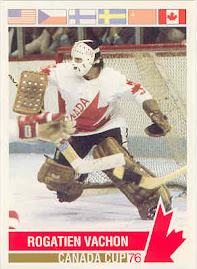
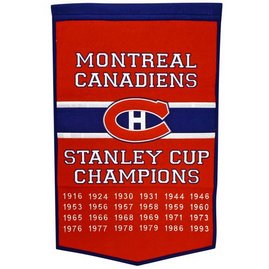







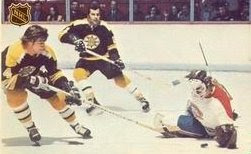



















































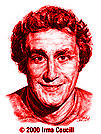



































































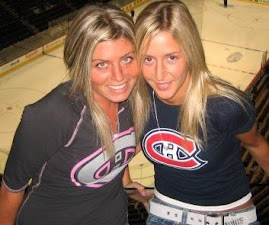


















No comments:
Post a Comment